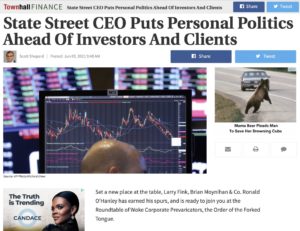
01 Jul 2021 State Street’s Neutrality Claims Fold Under Scrutiny
When confronted by the National Center’s Free Enterprise Project (FEP), State Street CEO Ronald O’Hanley claimed that the $3.6 trillion asset manager votes with its investors’ money objectively and free of political policy preferences.
 FEP Deputy Director Scott Shepard is calling him out.
FEP Deputy Director Scott Shepard is calling him out.
In a Townhall commentary, Scott declares that “State Street’s ESG research is not at all policy- and politics-neutral.” In fact, the company’s practices on environmental, social and governance (ESG) issues – which it acts upon at the peril of those who invest in the firm – actually appear to reflect the opinion of “State Street’s executives and research directors.”
So when O’Hanley says there’s no political bias, it could be because he just can’t understand why anyone would want to disagree with how he thinks!
Famed investment guru Warren Buffett has called many ESG agenda items “asinine” because they are “moral judgments” that are not necessarily rooted in sound financial strategy. At State Street’s annual shareholder meeting, Scott essentially challenged O’Hanley to say he was smarter than Buffett, and – in so many words – O’Hanley suggested he was.
Scott asked O’Hanley:
Can you explain in detail what you do to ensure your proxy decisions reflect the actual wishes of your investors instead of those of State Street executives?
O’Hanley replied that the way the company has voted peoples’ investments was “based on value.” He claimed that State Street Global Advisors (SSGA) – its research division – comes to determinations on votes for directors, proposals and leveraging State Street’s reputation based on “long-term shareholder value.”
But, as Scott points out in the Townhall commentary, SSGA CEO Cyrus Taraporevala told company board members in 2020: “We see that shareholder value is increasingly being driven by issues such as climate change, labor practices and consumer product safety.”
Scott elaborates:
Analysis quickly undermines these claims of objective, neutral and policy-preference-free research and decision-making. Our review of the SSGA research showed constant uncritical acceptance of left-wing assumptions without any corresponding critical evaluation of those assumptions, and certainly with no acceptance of center/right assumptions.
Consider, for instance, SSGA’s embrace of zero-carbon goals, goals set to political guidelines pushed by the United Nations in the Paris Climate Accords and following statements. SSGA seems not to have considered the political nature of the UN reports, nor to have undertaken its own apolitical scientific analysis. It does not seem to account for the likelihood that any reductions by American corporations will be swamped by the big producers, especially China and India, who have no real-world intention of reducing their emissions, and in fact behave as though they’ll grow into the foreseeable future. It does not consider the likelihood that technology will not be affordably available to permit zero-carbon emissions on the United Nations’ timeline without crushing the American economy, American competitiveness and the American people.
“If it does not consider these factors, and similar factors in other ESG contexts, then its decisions are purely political and ideological, and – as O’Hanley tacitly admitted, are based solely on the political and policy preferences of State Street executives,” Scott concluded.
Since objective decision-making would suggest agreement with a conservative position once in a while among State Street’s ESG considerations, it would be a different story. But that’s not the case.
To read all of Scott’s commentary – “State Street CEO Puts Personal Political Ahead of Investors and Clients” – click here to go to the Townhall website.




